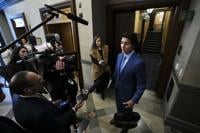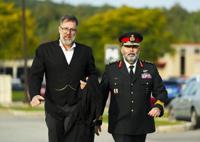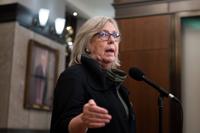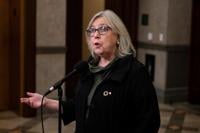OTTAWA - The federal government has presented a new health-care funding offer that would see Ottawa shift $196 billion to the provinces and territories over the next 10 years in exchange for commitments to massively upgrade health-care data collection and digital medical records.
The offer was met with a heavy dose of disappointment but also reluctant acceptance by the country's premiers, who learned of the proposal during a long-awaited first ministers' meeting in Ottawa Tuesday.
About one-quarter of that is money not previously promised through existing health-care transfer formulas and deals. The new money will mainly be divided between bigger increases to the annual Canada Health Transfer — an additional $17 billion over 10 years, over and above the previously planned increases — and $25 billion for targeted funding for family doctors, mental health, surgical backlogs and health data systems.
There will also be an immediate one-time $2 billion top-up to this year's Canada Health Transfer to help provinces ease the intense pressure on emergency rooms and children's hospitals.
Provinces can also get $1.7 billion over five years to increase wages for personal support workers in long-term care and home care.
A separate $2-billion fund will be offered for Indigenous health-care needs, through an agreement with Indigenous leaders.
Prime Minister Justin Trudeau laid out the proposal to the premiers at a meeting Tuesday near Parliament Hill that lasted about two hours.
"This is a massive investment in, not just the present of health care, but the future of health care," Trudeau said, at a news conference following the meeting.
He also left little room for negotiation. While the targeted funding for priorities will be delivered through the one-on-one negotiated deals with each province, those negotiations will only be about the conditions provinces will agree to in order to access the funds, not how much they'll get.
Trudeau said the government will be flexible to help the provinces meet their own circumstances, but that the provinces will have to show how they money will be spent and how they'll show progress in the priority areas.
He said he has "high expectations, but also reasonable expectations" that those negotiations will take "weeks, not months."
The premiers said the offer will increase the federal share of health care costs from 22 per cent to 24 per cent next year, far short of the 35 per cent the provinces and territories were demanding.
"To say the least, I think we were a little disappointed at that," said Manitoba Premier Heather Stefanson, who chairs the premiers' group and is the spokeswoman.
Still, most premiers appeared ready to accept the offer even as they promised the health-care talks were not over.
"I will never refuse new funding," Ontario Premier Doug Ford said as the premiers held a joint press conference following the meeting with Trudeau.
"What we see this as is a starting point, it's a down payment on further discussions."
The CHT offer is contingent on provinces bringing their health-care data collection into the 21st century. Canada has limited data to help understand where the weak points in its health-care system are or what is needed now or in the future. Digital patient records that can be easily shared between jurisdictions or health-care providers are also a federal demand.
Health Minister Jean-Yves Duclos said better data can "save lives."
Deputy Prime Minister Chrystia Freeland also said the federal government has the expectation any new federal funds will be added to provincial funds, and not used to displace provincial dollars so they can be redirected.
"That is what we expect, it will be used to do, and that is what şĂÉ«tvs quite rightly expect, as well," Freeland said.
Under the premiers' ask, the Canada Health Transfer would have exceeded $70 billion this year. It will be less than $50 billion. By the end of 10 years it would be more than $115 billion based on the premiers' formula, while the federal government forecasts this deal will bring it to about $73 billion.
The premiers had also asked for the CHT to increase a minimum of five per cent a year, up from the current three per cent base rate in place now. They're getting that for five years. It will revert to three per cent again after five years.
The CHT can grow above the base rate if economic growth outpaces the rate, but the current projection is that the CHT will grow 61 per cent by the end of the deal.
Trudeau said the financial offer is "a huge amount of money" that was made based on Ottawa's fiscal position, and knowing some provinces are already seeing budgetary surpluses.
The premiers are trying to stay united in the negotiations, remembering back to 2016, when a similar discussion with Ottawa broke apart when some provinces agreed to sign bilateral deals rather than hold out for the demanded increase to the Canada Health Transfer, which would have had fewer strings attached.
Ultimately all were forced to do so in order to get new money for mental health and home care.
In 2020 the premiers began asking Trudeau for another meeting to overhaul the health transfers, but he put it off until COVID-19 was no longer a crisis.
By last fall, the health-care system itself was seen to be in crisis, with thousands of backlogged surgeries, a burnt-out, understaffed health workforce and emergency rooms that could not keep pace with demand.
Stefanson said that everyone needs some time to digest the offer.
"They've had our proposal for 2.5 years and we've had it for 2.5 hours," Stefanson said. "We're going to have really to see what the details mean."
She said the premiers plan to meet again themselves in coming days to continue talking about the offer.
This report by şĂÉ«tvwas first published Feb. 7, 2023.










































